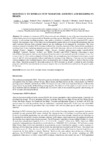Please use this identifier to cite or link to this item:
http://www.alice.cnptia.embrapa.br/alice/handle/doc/577864Full metadata record
| DC Field | Value | Language |
|---|---|---|
| dc.contributor.author | ARIAS, C. A. A. | pt_BR |
| dc.contributor.author | DIAS, W. P. | pt_BR |
| dc.contributor.author | CARNEIRO, G. E. S. | pt_BR |
| dc.contributor.author | OLIVEIRA, M. F. | pt_BR |
| dc.contributor.author | TOLEDO, J. F. F. de | pt_BR |
| dc.contributor.author | CARRÃO-PANIZZI, M. C. | pt_BR |
| dc.contributor.author | PIPOLO, A. E. | pt_BR |
| dc.contributor.author | MOREIRA, J. U. V. | pt_BR |
| dc.contributor.author | KASTER, M. | pt_BR |
| dc.contributor.author | BERTAGNOLLI, P. F. | pt_BR |
| dc.date.accessioned | 2011-07-15T01:04:03Z | - |
| dc.date.available | 2011-07-15T01:04:03Z | - |
| dc.date.created | 2009-12-14 | pt_BR |
| dc.date.issued | 2009 | pt_BR |
| dc.identifier.citation | In: WORLD SOYBEAN RESEARCH CONFERENCE, 8., 2009, Beijing. Developing a global soy blueprint for a safe secure and sustainable supply: proceedings. Beijing: Chinese Academy of Agricultural Sciences: Institute of Crop Science, 2009. Oral Presentations. WSRC 2009. Editado por Lijuan Qiu, Rongxia Guan, Jian Jin, Qijan Song, Shuntang Guo, Wenbin Li, Yuanchao Wang, Tianfu Han, Xiaobing Liu, Deyue Yu, Lianzhou Jiang, Deliang Peng. | pt_BR |
| dc.identifier.uri | http://www.alice.cnptia.embrapa.br/alice/handle/doc/577864 | pt_BR |
| dc.description | The soybean cyst nematode (SCN), Heterodera glycines Ichinohe, is one of the most important diseases in Brazil that causes losses in practically all Brazilian growing regions. Breeding for SCN resistance has become a priority for all soybean breeding programs, since genetic resistance is probably the only practical SCN control method. The oligogenic basis of resistance in soybean and the genetic diversity of nematode populations that can suffer selection pressure from resistant varieties are the challenges to be managed by researchers. The most common strategy to introduce SCN resistance in Brazil has been the selection of lines derived from populations resulting from crosses including adapted genotypes and North-American cultivars with resistance derived from ?Peking? (?Pickett?, ?Sharkey?, ?Centennial?, ?Padre?, ?Forrest?, ?Gordon?, among others) and/or from PIs 88788 (?Bedford?, ?Linford?, ?Fayette?, ?Leflore?, etc), 90763 (?Cordell?) and 437654 (?Hartwig?). Resistance of more than 60 Brazilian soybean cultivars was developed from few sources that normally provide resistance to race 3 or to races 1 and 3. A few varieties adapted to Central Brazil, the savannah area, have resistance to most races, except races 4+ and 14+ which are specific to Brazil and broke the resistance from ?Hartwig?. There are very few resistant varieties adapted to the Southern Region, where the demand for new resistant varieties is likely to increase in the near future. Selection assisted by molecular markers for SCN resistance is already a routine in some breeding programs and will become absolutely necessary to improve the selection efficiency and increase the genetic gains for this trait. | pt_BR |
| dc.language.iso | eng | eng |
| dc.rights | openAccess | eng |
| dc.subject | Nematóide de cisto | pt_BR |
| dc.subject | Resistant variety | pt_BR |
| dc.title | Resistance to soybean cyst nematode: genetics and breeding in Brazil. | pt_BR |
| dc.type | Artigo em anais e proceedings | pt_BR |
| dc.date.updated | 2011-07-15T01:04:03Z | pt_BR |
| dc.subject.thesagro | Glycine Max | pt_BR |
| dc.subject.thesagro | Variedade | pt_BR |
| dc.subject.thesagro | Soja | pt_BR |
| dc.subject.nalthesaurus | resistance management | pt_BR |
| riaa.ainfo.id | 577864 | pt_BR |
| riaa.ainfo.lastupdate | 2011-07-14 | pt_BR |
| dc.contributor.institution | CARLOS ALBERTO ARRABAL ARIAS, CNPSo; WALDIR PEREIRA DIAS, CNPSo; GERALDO ESTEVAM DE SOUZA CARNEIRO, CNPSo; MARCELO FERNANDES DE OLIVEIRA, CNPSo; JOSE FRANCISCO FERRAZ DE TOLEDO, CNPSo; MERCEDES CONCORDIA CARRAO PANIZZI, CNPSo; ANTONIO EDUARDO PIPOLO, CNPSo; JOSE UBIRAJARA VIEIRA MOREIRA, CNPSo; MILTON KASTER, CNPSo; PAULO FERNANDO BERTAGNOLLI, CNPT. | pt_BR |
| Appears in Collections: | Artigo em anais de congresso (CNPSO)  | |
Files in This Item:
| File | Description | Size | Format | |
|---|---|---|---|---|
| id30124.pdf | 136,83 kB | Adobe PDF |  View/Open |









